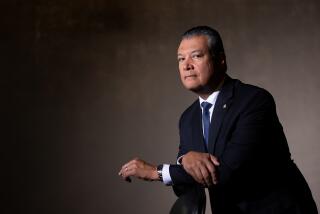Be Big, Councilman Padilla
- Share via
Talk about a test of leadership. A month after his upset election to the coveted presidency of the Los Angeles City Council, 28-year-old Alex Padilla on Tuesday faced a chamber packed with nearly 300 mostly African American community and religious leaders incensed over one of his first decisions. In making council committee assignments, Padilla had failed to appoint any of the three black council members--who opposed him for the presidency--to two important committees. These committees are key in determining city spending on housing and economic development.
The standing-room-only crowd saw the omission as worse than political payback. It was a slap in the face to Los Angeles blacks and to the South and South-Central Los Angeles communities the three council members represent. Speaker after speaker thundered at Padilla, pleaded with him, even prayed for him to reconsider.
When the three council members--Nate Holden, Mark Ridley-Thomas and newcomer Jan Perry--first protested the committee appointments a week ago, Padilla defended his assignments, saying they were based on interests and experience, not political payback and certainly not race.
At the time, the brouhaha looked like the typical posturing for position that inevitably goes on inside City Hall. It is, after all, the council president’s prerogative to make committee appointments, and if his supporters get the assignments they asked for and opponents are sent to the equivalent of committee Siberia, that’s politics. But whether or not it was just politics to begin with, the issue has become bigger than that now.
The challenge for Padilla is to be bigger still, to see negotiation and compromise as a strength, not a weakness. It’s way past the time when he should recognize that. As council president, he has to be a citywide leader and do everything he can to ease the simmering racial and ethnic tensions that plague Los Angeles.
The protesters who turned out at Tuesday’s City Council meeting clearly felt that, as their badges proclaimed, they had not been given a seat at the table. Given the community’s history of disenfranchisement, not to mention South and South-Central Los Angeles’ dire need of housing and jobs, the right thing to do is to offer that seat.
Padilla endured the public scolding with what even one of the protesters described afterward as grace under fire. He thanked the speakers for their comments (and prayers) and promised a resolution soon. There will inevitably come a time when, faced with a roomful of protesters, he will have to stand his ground out of principle. But this is not that time. This time the principle is inclusion.
More to Read
Sign up for Essential California
The most important California stories and recommendations in your inbox every morning.
You may occasionally receive promotional content from the Los Angeles Times.













